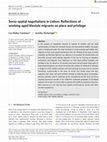Papers by Jennifer McGarrigle

Mediterranean Mobilities, 2018
Moroccans are a recent and small migrant group in Portugal, yet they are significantly represente... more Moroccans are a recent and small migrant group in Portugal, yet they are significantly represented in the agricultural sector. Over 30% are concentrated in Algarve, the most southern region of the country with a more recent presence in Lisbon. Given their recent presence in Portugal, little is known about their process of integration or their migration experiences. This chapter has two main objectives. First, we provide a reading of the characteristics of Moroccan migrants in the Algarve and their integration. Second, we explore the role that network ties have in perpetuating migration to Portugal. In particular, we examine the role of current migrants in providing feedback and assistance to new/potential migrants considering migrating to Portugal. According to migration theory, migration increases over time as networks and social structures are established to sustain it (Massey et al. 1998). Such ties link migrants and non-migrants between origin and destination countries and may b...
Alto Comissariado para as Migrações, I.P., 2017

Population, Space and Place
In the context of inequalities inherent in regimes of mobility and the rapid transformation of Li... more In the context of inequalities inherent in regimes of mobility and the rapid transformation of Lisbon by increased tourism and transnational mobility, this paper seeks to foreground under-the-radar narratives of young working-aged middle-class migrants on their socio-spatial positioning in the city. Situated at the nexus of youth mobilities and lifestyle migration, our objective is to examine the stratifications and diversities present within lifestyle migration to the city by focusing on migration motivations and migrants' own reflections on their place-making strategies and privilege in the city. Based on 10 narrative interviews and participant observation in transnational hangouts, our results reveal how the creation of "alternative" lifestyles is hinged on both mobility practices and local moorings as young movers reinvent themselves professionally in the place of arrival. Our results show that they negotiate their place and social position through (i) balancing place-consumption practices between what is construed as the transnational and the local and (ii) by situating themselves outside of the subjective residential geography of privileged migrants. This is part of a moral code to appease their political conscience and justify their presence in a city that has been rapidly transformed by tourism and other transient populations.
IMISCOE Research Series
In the context of the growing global middle class, and the ageing of the baby boomer generation, ... more In the context of the growing global middle class, and the ageing of the baby boomer generation, an increasing number of migrants with accumulated wealth from advanced economies are relocating to economically less developed or more peripheral countries to improve their quality of life. Migration of the middle-classes and the relatively affluent is embedded in the same globalising processes and social transformations in production and processes of accumulation that have reshaped labour migration (Hayes, 2021; Castles, 2010). Privileged mobilities are part of wider migration systems, however, what distinguishes lifestyle migrants from other migrants, who are also in pursuit of a better quality of life, is the ease with which they can relocate due to relative privilege in terms of citizenship and financial or cultural capital.

In the context of the growing global middle class, and the ageing of the baby boomer generation, ... more In the context of the growing global middle class, and the ageing of the baby boomer generation, an increasing number of migrants with accumulated wealth from advanced economies are relocating to economically less developed or more peripheral countries to improve their quality of life. Migration of the middle-classes and the relatively affluent is embedded in the same globalising processes and social transformations in production and processes of accumulation that have reshaped labour migration (Hayes, 2021; Castles, 2010). Privileged mobilities are part of wider migration systems, however, what distinguishes lifestyle migrants from other migrants, who are also in pursuit of a better quality of life, is the ease with which they can relocate due to relative privilege in terms of citizenship and financial or cultural capital. Lifestyle migration has developed as a way of conceptualising these practices. It is a growing research field within migration studies focussing on "migrations where aesthetic qualities including quality of life are prioritised over economic factors like job advancement and income" (Knowles & Harper, 2009, p. 11). This form of leisure or tourism-led mobility receives much less attention than labour or refugee migration to advanced economies, which has been the traditional focus of migration research. Some scholars have argued that the overwhelming attention paid to labour, family, and humanitarian migration has construed a limited picture of who migrants actually are. In turn, the expanding literature on migrants who possess higher social, economic, and political capital is important for the contribution it makes to a more complex understanding of migration forms, the way it unsettles assumptions of marginality, and the insights it provides into inequalities in global migration regimes (Croucher, 2012). Indeed, in terms of migration governance, migration into the global North has become increasingly regulated and contested, while out migration

Population, Space and Place, 2022
In the context of inequalities inherent in regimes of mobility and the rapid transformation of Li... more In the context of inequalities inherent in regimes of mobility and the rapid transformation of Lisbon by increased tourism and transnational mobility, this paper seeks to foreground under-the-radar narratives of young working-aged middle-class migrants on their socio-spatial positioning in the city. Situated at the nexus of youth mobilities and lifestyle migration, our objective is to examine the stratifications and diversities present within lifestyle migration to the city by focusing on migration motivations and migrants' own reflections on their place-making strategies and privilege in the city. Based on 10 narrative interviews and participant observation in transnational hangouts, our results reveal how the creation of "alternative" lifestyles is hinged on both mobility practices and local moorings as young movers reinvent themselves professionally in the place of arrival. Our results show that they negotiate their place and social position through (i) balancing place-consumption practices between what is construed as the transnational and the local and (ii) by situating themselves outside of the subjective residential geography of privileged migrants. This is part of a moral code to appease their political conscience and justify their presence in a city that has been rapidly transformed by tourism and other transient populations.

24th Annual European Real Estate Society Conference, 2017
During the last two decades, it has become increasingly popular to buy a second home, with a sign... more During the last two decades, it has become increasingly popular to buy a second home, with a significant number of these acquired abroad. Several factors explain this trend, including: general growth in households’ income; more leisure time, longer holidays, part time employment; more flexible employment including remote working; the housing wealth effect; lower barriers of distance; greater mobility; the liberalisation of financial markets; domestic technology innovations; and new forms of hyper consumption (Paris, 2009). The demand for second homes by foreign buyers in Portugal has been increasing since 2013, in some cases surpassing pre-crisis demand. The motives of this new wave of foreign buyers in Portugal seem to have undergone significant changes. Before the crisis, the key motivations driving second home ownership by foreign buyers were leisure or lifestyle (holiday and or retirement) and investment (to let investment and resale potential and investment diversification) (King, Warnes and Williams, 2000; Janoschka and Haas, 2014). While increasing international investment in the Portuguese property market has attracted media and public attention, there are few studies that try to understand new buyer motivations. Similarly, there is a lack of both empirical and theoretical analyses that elucidate the way in which foreign second homeowners affect housing market dynamics. This paper aims to fill this gap through a comparative triangulated analysis of pre- and post- crisis motivations. We draw on a unique survey sample collected in 2006-7 of British overseas second homeowners. To understand the processes instigating post-crisis shifts, we draw on qualitative fieldwork conducted in 2016/2017 including semi-structured interviews with real estate professionals and other key actors. Alongside new motivations, our results reveal the continued importance of lifestyle mobility related with quality of life, lower costs of life, proximity, climate and security (Sardinha, 2013; Torkington, 2012, O´Reilly, 2007). Today, however, new incentives and strategies, related with taxation and immigration policy, are driving the increasing trend of second home buying in Portugal. We conclude that macro and micro factors related with changing economic and political factors provide the structural opportunities for a diversifying group of residential tourists, investors and migrants in Portugal and reflect critically on the sustainability of this trend.
Timespace and International Migration
International Encyclopedia of Human Geography, 2020

International Residential Mobilities, 2021
This chapter foregrounds discussions on the city as a lifestyle destination in the context of inc... more This chapter foregrounds discussions on the city as a lifestyle destination in the context of increasing urban tourism and privileged migration to the city of Lisbon. Drawing on qualitative data collected, between 2017 and early 2020, through life history interviews, this chapter aims to explore how intra-EU migrants benefiting from the Non-Habitual Residence (NHR) fiscal scheme understand and narrate their migration aspirations, motivations and locational choice. The desire to move is induced by past mobility experiences attending to the idea of migration as an ongoing transformative process. The structures of tourism are essential in creating a pre-migration imaginary of place and a mechanism in the decision-making process as movers travel to compare different locations refining place attributes conducive to their desired mode of life. Despite the tourism-induced nature of lifestyle migration to Lisbon, this chapter makes the case for analytical distinctiveness between tourism and lifestyle mobilities. Folding them together obscures the political asymmetries in the EU mobility regime and constellations of privilege reinforced by fiscal benefits. Moreover, in this case, the interpretative frames that migrants use to understand their mobilities dissociates them in ideological terms from tourists. The urban lifestyle prism reveals diverse lifestyle-led mobilities from retirees to working families in search of a lower-cost and slower urbanism and a better work-life balance supported by city infrastructures for consumption and continued production for the non-retired movers.

Tourism Geographies, 2018
In the aftermath of the economic crisis, Lisbon has ascended on to the urban tourism and internat... more In the aftermath of the economic crisis, Lisbon has ascended on to the urban tourism and international property market with a velocity that is transforming the city. Investor immigration programmes and fiscal policy have met their objective of attracting wealthy third country and intra-EU migrants to invest in housing in the city. To date, there is a dearth of empirical and theoretical analyses that explicate the motivations and aspirations of international overseas residential investors. Situated at the intersection of the literature on investment and lifestyle migration, and based on 20 in-depth interviews with experts in the intermediary elite economy, our objective is to understand buyer motivations and the current attraction of the city. We present our results in the form of a typology of new transnational urban homeowners revealing complex forms of mobility that intersect in the city. Our results reveal the continued importance, both directly and indirectly, of lifestyle motivations related with quality of life, culture, amenities and climate. Yet, economic motivations are the most significant, even if diverse, among the residential investor typologies with some seeking a safe haven and others geoarbritage or income optimization. Moreover, our results suggest that the success of government incentives (immigrant investor programmes or tax exemptions) to attract foreign second home buyers are dependent on prospects of city economic growth, rent legislation and the perceived attractiveness of the city/region for tourists making them difficult to replicate across contexts.

Journal of Ethnic and Migration Studies, 2017
The arrival in Portugal of recent migrants from the Indian subcontinent is normally a secondary m... more The arrival in Portugal of recent migrants from the Indian subcontinent is normally a secondary movement from within Europe tied to the search for a regular pathway into legal integration in the EU. However, as favourable migration policy is not paired with easy economic integration onward migration is common. We argue that such complex migration strategies cannot be amply explored through an origin-destination model; instead we suggest that a translocal perspective provides a framework to examine connections and experiences of emplacement in places of passage/reception like Lisbon. Through a qualitative study of the migration journeys and emplaced practices of Punjabi migrants in Lisbon, our findings highlight relationality between multiple scales, elucidating how agency and structure interact at micro and macro levels in shaping migration experiences and outcomes. We show how the materiality of local community structures ensures the navigation of daily life in the city and provides pathways toward legality contributing to wider mobility regimes. Moreover, we illustrate how onward migration represents an individual strategy to realise different aspects of integration in other EU destinations challenging nation-statebound understandings of citizenship/settlement and integration.

Social Inclusion, 2017
Besides a more general concern over transport infrastructure, its quality and availability, mobil... more Besides a more general concern over transport infrastructure, its quality and availability, mobility is also a pre-condition for city dwellers to access urban resources, facilities, employment, local services and leisure. Moreover, mobility allows urban inhabitants to uncover a city’s potentialities and to fully participate in urban life. Migrants, nevertheless, face the issue of learning to do mobility in a new environment together with the urgency for settlement, finding work, making personal connections and attending to the mundane needs of everyday life that require one to move about. This article looks at migrants’ urban mobilities in Lisbon, Portugal, from two perspectives. First, we look at migrants’ urban knowledge and skills and at how they employ their abilities to use Lisbon’s urban resources. Second, we address some of the ways place-specific urban resources of a religious nature sustain and are sustained by various (im)mobility practices. More specifically, we look to a...

Migration and the sustainability of the welfare state are irrefutably two essential topics in the... more Migration and the sustainability of the welfare state are irrefutably two essential topics in the political debate throughout Europe. Not only has the dominant pattern within the political discourse been focused on the generosity of benefits attracting migrants as, until recently, researchers tended to concentrate on the supposed “weight” of migration on destination countries. This view contrasts with new perspectives that highlight not only the levels of unawareness regarding benefits or social services in the destination countries as well as transnational practices involving a myriad of formal and informal providers across borders. Drawing on qualitative data gathered through 39 interviews conducted with British migrants in Portugal and Portuguese migrants in the UK, we explore migrants’ welfare experiences. Deploying the idea of social protection assemblages, which is the combination of formal and informal elements of protection, the analysis explores the welfare tactics that mig...
McGarrigle, J., & Ascensão, E. (2017). Temporalities of onward migration: long-term temporariness, cyclical labour arrangements and lived time in the city. In Mavroudi, E., Page, B. and Christou, A. (eds.)Timespace and International Migration: 77-90. Edward Elgar Publishing., 2017











Uploads
Papers by Jennifer McGarrigle